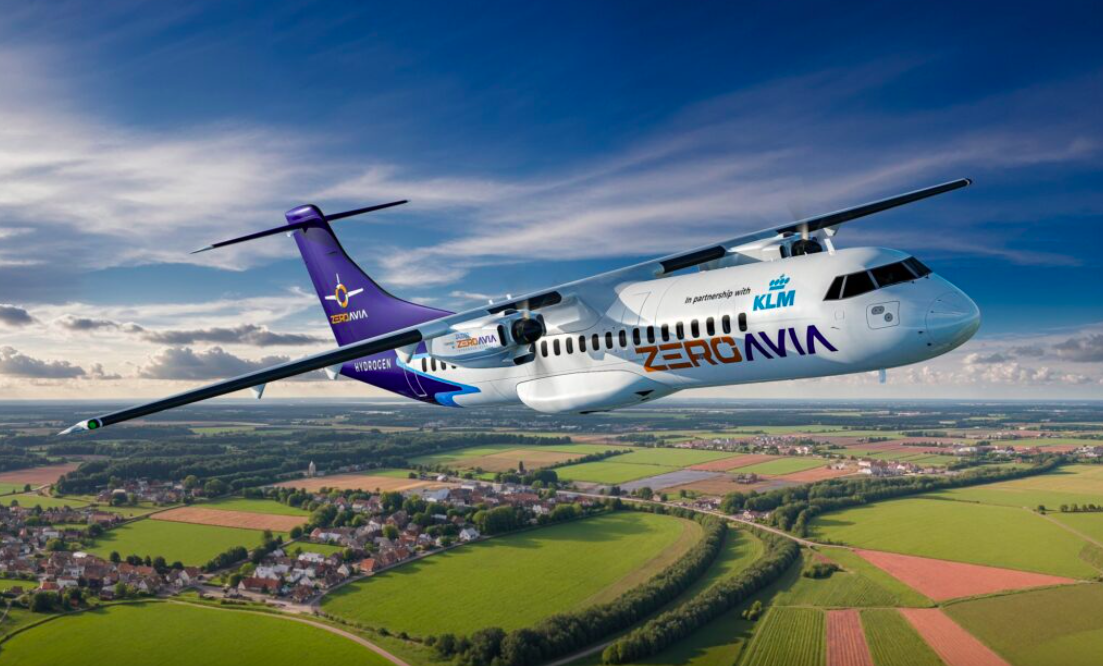Hydrogen-powered turboprop flight in 2026
July 29,2024

KLM and ZeroAvia team up to trial hydrogen-powered turboprop flight in 2026
What are the advantages of hydrogen-powered aircraft?
 The advantages are clear: hydrogen as on-board fuel or energy will allow for the complete elimination of CO2 emissions in flight, and along the entire energy life-cycle if produced from renewable sources.
The advantages are clear: hydrogen as on-board fuel or energy will allow for the complete elimination of CO2 emissions in flight, and along the entire energy life-cycle if produced from renewable sources.  Its usage in fuel cells allows for zero-emission propulsion (including NOx and particles).
Its usage in fuel cells allows for zero-emission propulsion (including NOx and particles). A 2020 study by the EU Clean Sky 2 and Fuel Cells and Hydrogen 2 Joint Undertakings found that hydrogen could power short-range aircraft by 2035.
A 2020 study by the EU Clean Sky 2 and Fuel Cells and Hydrogen 2 Joint Undertakings found that hydrogen could power short-range aircraft by 2035. A short-range aircraft (< 2,000 km, 1,100 nmi) with hybrid Fuel cells/Turbines could reduce climate impact by 70–80%.
A short-range aircraft (< 2,000 km, 1,100 nmi) with hybrid Fuel cells/Turbines could reduce climate impact by 70–80%. “The world’s largest airlines are diving in to explore hydrogen-electric as a potential solution with increasing seriousness,” James Peck, Chief Customer Officer at ZeroAvia, said. “We can’t wait to work with KLM, being an airline with such a rich history, as we look towards a clean future for the industry.”
“The world’s largest airlines are diving in to explore hydrogen-electric as a potential solution with increasing seriousness,” James Peck, Chief Customer Officer at ZeroAvia, said. “We can’t wait to work with KLM, being an airline with such a rich history, as we look towards a clean future for the industry.”
Hydrogen-electric propulsion developer ZeroAvia and KLM Royal Dutch Airlines will team up to trial a turboprop aircraft demonstration flight powered by hydrogen-electric engines.
The partnership was announced as part of a joint press conference by ZeroAvia and KLM on July 24, 2024, at the Farnborough Airshow.
The planned demonstration flight will use ZeroAvia’s ZA2000 hydrogen-electric engines which have been designed for large regional turboprops.
ZeroAvia and KLM confirmed ambitions to launch the initial demonstration flight between two airport locations in 2026.
Efforts will begin acquiring regulatory permits to fly ensuring the infrastructure is in place to supply liquid hydrogen fuel to the aircraft.
The maintenance divisions of KLM and Air France have already been working with ZeroAvia to build the knowledge base for effective MRO operations for hydrogen fuel cell planes.
“KLM aims to be a front-runner in the journey towards a more sustainable future in aviation,” Maarten Koopmans, Managing Director, KLM Cityhopper said. “That’s why we actively support and encourage innovation to drive industry change. When it comes to the future of zero-emission flights, KLM supports various technologies and innovations simultaneously. Together with our sector partners, we are conducting research on electric, hydrogen, and hybrid-powered flights and exploring ways to expedite these advancements.”
ZeroAvia has already extensively tested a prototype of its first ZA600 engine aboard a Dornier 228 aircraft at its UK base.
On July 22, 2024, an amphibious aircraft developer announced at Farnborough Airshow that it had selected ZeroAvia’s fuel cell power generation system technology.